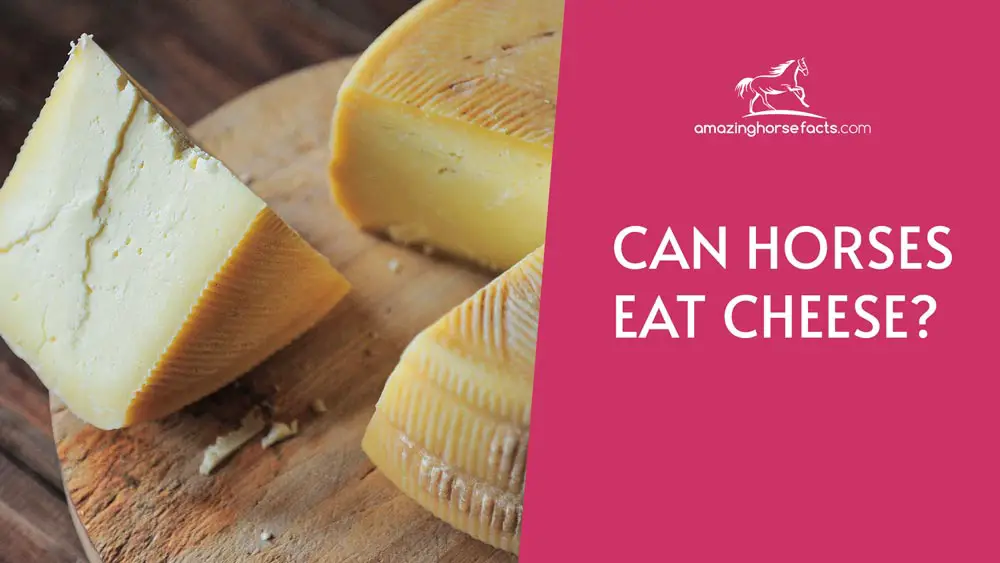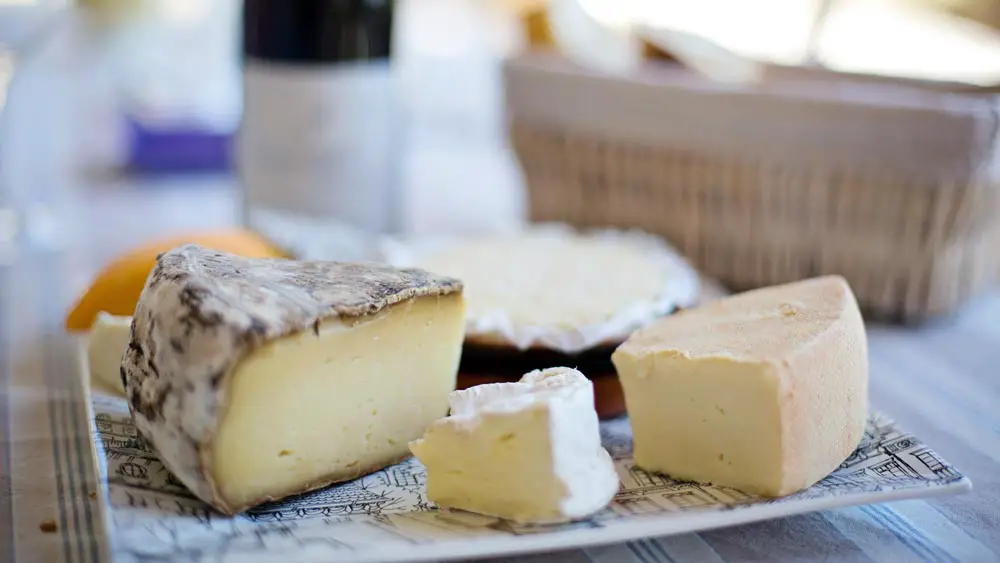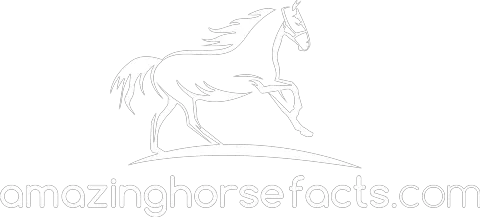Skip To Section

Can Horses Eat Cheese?
If you’ve ever thought about feeding your horse some cheese as a treat, think again. While a little bit of cheese by accident isn’t toxic to horses, it is definitely not something you want to include as a regular part of their diet. Cheese can cause your horse a lot of tummy trouble.
Whether you’re sinking your teeth into a juicy cheeseburger, putting together a delicious charcuterie board with artisan cheeses from around the world, or slathering cream cheese on a bagel, it’s safe to say that most people LOVE cheese.
Children and adults alike can all agree that almost everything tastes better with some kind of cheese on it. Also, cheese is a safe snack for other animals like dogs.
So why can’t horses enjoy a bite of cheddar or brie here and there?
While cheese may seem like an easy snack to share with your equine pal, it’s definitely not recommended and may land you with an expensive veterinary bill and working overtime cleaning up after your horse.
So why can’t your horse enjoy cheese as a snack too? Read on to find out more about why it’s just not a good idea to give your horse any kind of cheese.
Do Horses Eat Cheese?
No, horses do not eat cheese. It is not part of their standard diet, and really should be avoided even as an occasional snack for a few reasons.
As a horse owner, you are likely already very aware of the fact that horses have slightly difficult digestive systems. There are a handful of everyday foods that can make them sick, with symptoms ranging from mild stomach upset to potentially fatal side effects.
So why is cheese on the list of foods you should avoid feeding horses? Are all cheeses off-limits or just certain types?
The fact is that adult horses are lactose intolerant, so it is very important not to feed them any dairy products. This includes all types of cheese.
Adult horses across all breeds are just physically not able to digest lactose in their stomach.
It is recommended not to feed your horse anything that includes cheese, yogurt, milk, ice cream, or anything that might include dairy to avoid causing your horse any unnecessary distress or sickness.
What Happens If Your Horse Has Cheese?
Here are some symptoms to look out for:
- Bloating
- Digestive Upset
- Diarrhea
- Colic
While it’s clear that having an accidental bite of cheese won’t necessarily kill a horse, avoiding these symptoms is obviously ideal.
One interesting thing about horses is that when they experience any kind of digestive upset, they cannot vomit to eliminate whatever is making them sick. That is why they tend to feel the unpleasant side effects of eating something they shouldn’t, like cheese, for much longer.
If your horse does ingest a small amount of cheese by accident, it may not have a huge effect but you can be sure that your horse will be pretty upset with you!
Typically if they do get into some cheese, you will see a general malaise in your horse’s demeanor indicating that they don’t feel well, and you will notice some or all of the symptoms listed above.
While the side effects may not be dire, intentionally feeding your horse large amounts of cheese should always be avoided to avoid diarrhea and colic.
My Horse Ate Cheese. Does He Have Colic?
Colic is an umbrella term used to describe any kind of abdominal discomfort in both humans and animals, including horses. Horse colic is a very common side effect when horses ingest cheese of any kind. It is essentially a spasm in their stomach that is reacting to the food it is unable to process
The symptoms of colic in horses can vary from case to case and horse to horse.
With a mild case, you may notice your horse seems to be very withdrawn, tired, or uncomfortable after having cheese. In more severe cases, horses may thrash around violently because of the pain and require veterinary attention.
Some foods may affect your horse more than others, but as a responsible horse owner, it’s important to know that cheese is a very common culprit of colic in horses.
Always alert your veterinarian right away if you suspect that your horse has eaten cheese and is experiencing symptoms of colic so that they can help you manage their discomfort.

Do Horses Like Cheese?
It’s hard to say whether horses like cheese because they really should not be given the opportunity to try enough cheese to form an opinion one way or the other.
I’m sure there are some horses who think cheese is tasty, but it’s still best to skip it.
Any way you slice it, cheese just is not good for horses. Since they are lactose intolerant, their bodies are not made to process the lactose in dairy products.
As discussed above, there can be some very uncomfortable side effects from feeding cheese to your horse. Make sure that anyone who will be handling your horse, like trainers or riders, knows not to offer any cheese to your horse.
There are plenty of other snack or treat options for your horse that are nutritious and widely enjoyed by your equine friends that don’t pose a risk of making them sick and having to call your veterinarian.
So what can horses eat for a snack if they can’t have cheese? Plenty of things!
Your pantry and fridge are likely full of horse-friendly human foods that you can easily give instead. You just may need to look a little bit harder and get creative.
Here’s a quick list of great horse treat options that are nutritious and well-loved by horses. There is certainly more than this, but these foods are a great place to start as an alternative to feeding your horse cheese.
Snack Or Treat Ideas For Horses:
- Fruits – Dried or raw and cut up small to avoid being a choking hazard
- Vegetables
- Carrots (a favorite!)
- Lettuce
- Green Beans
- Celery
- Sugar Cubes
- Pretzels
- Sunflower Seeds
- Oatmeal
These are just a few items that you most likely have in your refrigerator or pantry and can easily share with your horse. Other than cheese, is there anything else that you shouldn’t give to your horse?
Generally speaking, your horse only needs to eat horse feed (hay or grass) and have access to plenty of fresh water to have a nutritious diet. So extra treats or snacks aren’t “necessary” for their overall health.
Of course, treats are a fun and important part of interacting with your horse during play or training so it’s key to know what is safe to feed and what is not.
We’ve already discussed some of the good options to give your horse for snacks, but now it’s time to talk about what else is in the “no” bucket along with cheese.
There are a lot of human foods that can cause adverse effects in horses, whether just digestive issues or something more serious. We already know cheese is off-limits, but here are a few other foods that you should never feed your horse for a variety of reasons.
This list is not exhaustive and always check with your veterinarian if you are unsure if something is safe for your horse to eat.
Foods To Avoid Feeding Your Horse:
- Dairy – Horses are lactose intolerant so dairy products upset their stomachs.
- Avocado – All parts of an avocado including the skin, flesh, and pit are toxic to horses.
- Nightshade fruits or vegetables – Can cause digestive upset and colic.
- Lawn Clippings – Concern about toxic chemicals and choking if they eat too much.
- Meat – Horses are herbivores, so they do not need animal protein.
- Caffeine – Can cause health problems and cause horses to fail a drug test.
- Chocolate – Includes trace amounts of caffeine and can cause stomach upset.
Can Horses Eat Cream Cheese?
No, cream cheese is a dairy product and should be not be fed to horses. If your horse accidentally gets into some cream cheese, he likely won’t suffer any long-term effects but he will have a belly ache.
Cream cheese should be treated the same way that any other kind of cheese does when it relates to horses, just don’t do it.
As tempting as it may be to share your bagel and cream cheese with your horse, it’s simply just not worth him feeling sick and uncomfortable for several days because of it.
Conclusion
We know that as a horse owner, you treat your horse like family. You make sure that they are getting plenty of food, exercise, play, and more all the time. It can be tempting to want to give your horse all kinds of foods that you eat, but you must be mindful of what those things are.
It’s easy to just want to toss over a bite of whatever you’re eating to your horse. Most of the time that is probably fine to do, but it’s so important to know what the best and worst things are to give your horse so that you don’t give them something that doesn’t agree with their delicate digestive system.
The last thing you want is to be calling your veterinarian because your horse is sick or suffering from a bad reaction to something that they ate. An episode after having cheese, or other dairy products, can last several days and may mean your horse misses events, races, or just riding time with you.
Unfortunately, even though cheese is a huge staple in the American diet (and most of the rest of the world), it is something that is just not safe to give to your horses due to their lactose intolerance.
Just the same as how you would not expect a lactose intolerant person to eat a cheese pizza or bowl of ice cream, the same rules apply for horses. There are plenty of other foods that they can safely eat, so they will not be lacking in the treat department even without cheese as an option.
Of course, if you accidentally give your horse something with cheese in it, they will most likely be just fine. They may just have an upset stomach, discomfort, and diarrhea for a few days as their body tries to move it through their system.
Make sure to keep your pantry stocked with things that you can easily offer as a treat for your horse, and just make sure to prepare it properly and always offer any treat or snack foods in moderation.
